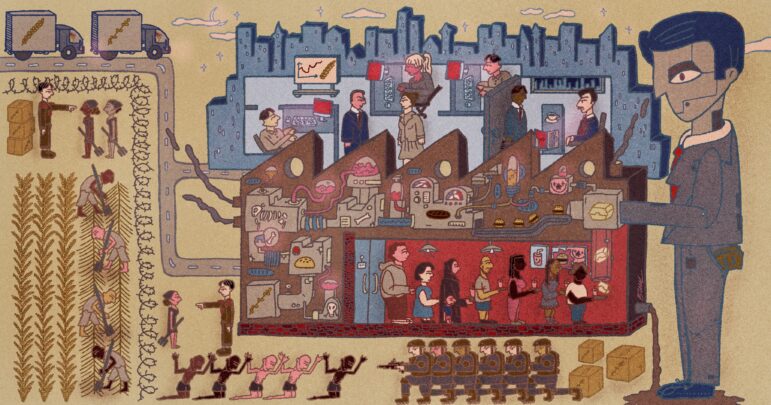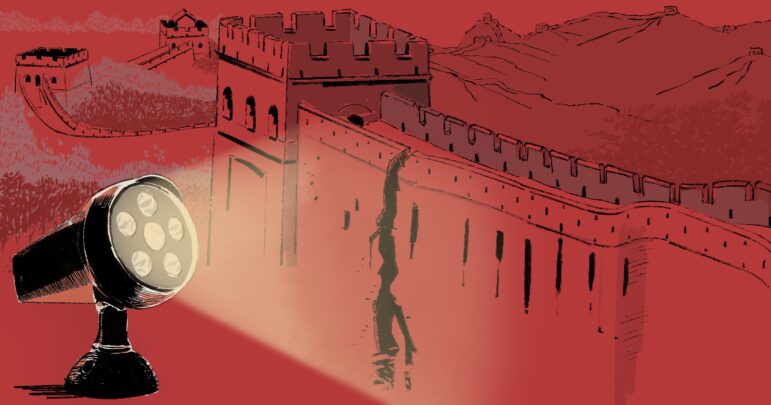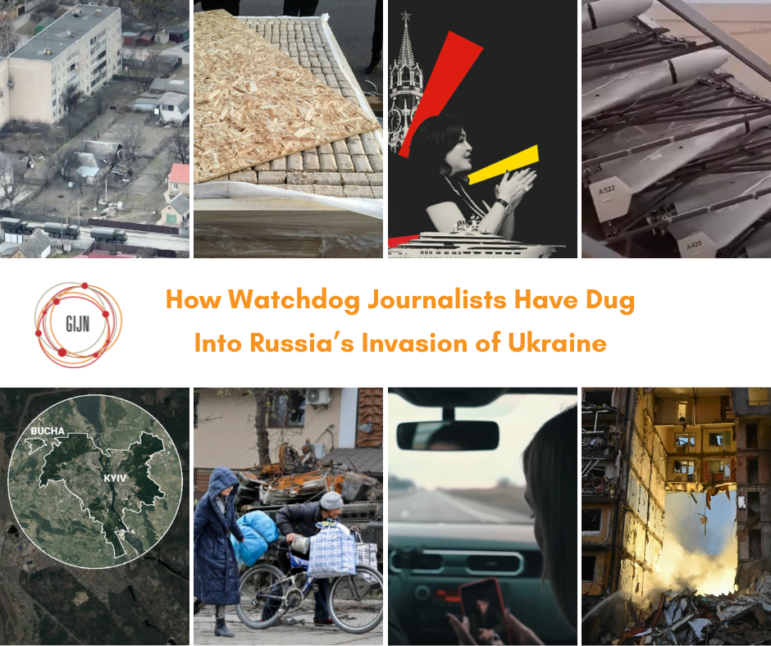

Belarusian political activist Sviatlana Tsikhanouskaya being interviewed by a Radio Free Europe/Radio Liberty reporter in Paris, France, 2022. Image: Pavel Krichko, Flickr, Creative Commons
What’s Lost if Voice of America Disappears: Watchdog Spirit, Intrepid Reporters, and Focus on the Global South
Read this article in
A reporting network that reaches hundreds of millions of people around the world, established with the aim of promoting democracy, and often providing the only alternatives to local, state-run media networks is under assault.
But while sites like Voice of America, Radio Free Europe/Radio Liberty, and Radio Free Asia are looked to for alternative, fact-based reporting in many places, they nonetheless have become the latest journalism organizations facing an existential threat from US President Donald Trump.
In mid-March, the White House abruptly announced its intent to cut funding and begin mass layoffs within the US Agency for Global Media (USAGM), which has a Congressionally-appropriated annual budget of $860 million. Though not well known, the USAGM is the umbrella agency responsible for the Voice of America (VOA), Radio Free Europe/Radio Liberty (RFE/RL), and other US-funded news organizations that are household names in many parts of the world.
These news sites, in total, reach a global audience of an estimated 360 million people every week and produce digital, TV, and radio content in 47 languages.
“Silencing of USAGM media in this case means silencing vulnerable and oppressed groups of people that would lose access to the media,” warns Oleg Khomenok, senior adviser at Internews and GIJN board member. “Hundreds of millions of people might be deprived of independent and unbiased information sources that distribute news in the local language.”
To dismantle VOA and RFE/RL would also silence hundreds of reporters who have spent years or decades serving overlooked parts of the world and who are often the only ones covering topics like human rights, corruption, and war crimes — sometimes at great personal peril.
According to the Committee to Protect Journalists, since 2003, nine media members who have worked for or contributed to VOA have been imprisoned and nine more were killed during that same period. Two VOA contributors are currently in jail. Sithu Aung Myint was arrested in 2021 on charges of incitement and defaming the military in Myanmar and has been sentenced to a combined 12 years in prison. Investigative journalist and Radio Free Asia contributor Pham Chi Dung, who exposed corruption and misconduct within Vietnam’s government, was arrested in his home country and is currently serving a 15-year sentence for “anti-government propaganda.”

The Voice of America was founded during World War II and has editorial independence from US government interference built into its charter. Image: Shutterstock
To justify such a consequential decision, the Trump administration claims that VOA and other USAGM news is biased and fails to sufficiently project “pro-American” perspectives to the rest of the world. But the VOA, which was established in 1942 to counter Nazi propaganda, had editorial independence built into its founding charter, and the 1994 US Broadcasting Act prohibits any interference by government officials in the work of its editorial staff.
This effort to all but eliminate the USAGM’s worldwide broadcasting and publishing presence comes just weeks after the Trump administration launched a broad campaign to gut the US State Department’s Agency for International Development (USAID), igniting a funding crisis that also jeopardized the future for an untold number of independent and investigative journalism sites around the world.
The drastic USAGM funding cuts are now being fought in the US courts — much like the USAID program cancellations — to varying degrees of success. At the end of March, a federal judge halted the mass layoffs at VOA, while another ordered RFE/RL’s funding restored through September. But these victories may only be temporary, and the future of the USAGM’s news operations remains under serious threat.
RSF joined together with VOA journalists and some labor unions to block the funding cuts in court. “The temporary restraining order is to stop the bleeding and then next step is to start saving the patient,” says Clayton Weimers, executive director, RSF USA, who also added that they will file a motion for injunction, to indefinitely pause any further action taken against VOA.
Khomenok also pointed to the ripple effect USAGM’s absence would have on global journalism in general and cited, in particular, the critical role its affiliates have in his region. “Radio Liberty and Voice of America are the professional standards setters in the post-Soviet countries, including Eastern Europe, Caucasus, Central Asia, and Russia,” Khomenok explains. “USAGM provided substantial efforts in enlightening and training local reporters either inside the country or through study visits or internships and the newsrooms in Prague and Washington. Evidently, collapsing USAGM media will cause declining professional standards and professional level of local journalists and media.”
Debunking Mis/Disinformation
In the last few years, a huge part of VOA’s work has involved debunking mis- and disinformation. “In countries where the state overwhelmingly dominates the media spaces, there is no space for fact checks,” notes Fatima Tlis, supervisory editor of VOA’s fact check unit Polygraph.info, where the focus is debunking Russian disinformation and Chinese state propaganda. “We’re trying to fill that gap.”
Tlis is uniquely suited to do her job. Based in the Northern Caucasus, Tlis was a reporter for the Associated Press during the Second Chechen war from early to mid 2000s. She said she had been kidnapped by the Russian agencies, tortured, and threatened to be killed. “I know what it is like to speak truth to power,” she says. In 2007, she and her family were granted political asylum in the US.
Her fact-check unit had 10 people when it began in 2016. Over the years, the unit shrunk due to funding cuts. When VOA’s staff were ordered to go on leave in mid-March, there were only three people in her unit.
Tlis said no one needs reminding how important fact checks are at a time when there is an information overload on the internet. “But, you cannot begin to imagine what it is in countries where fact checking is not even a concept,” she added.
Tlis acknowledges that since VOA only broadcasts outside the US, it is tough for Americans to understand its importance on the global stage and how foreign audiences appreciate its independent reporting. “But now is the time to show them that VOA is crucial,” she says.
Reaching Remote Places
Over eight decades of reporting, VOA had garnered a reputation of supporting human rights across the globe. Saman Khan, who has been a full-time overseas contractor from Pakistan at the VOA since 2017, recounts one particularly striking moment about the respect VOA had earned abroad. “The woman — my source — had waited for eight hours just to give me an interview,” Khan recalls. “The woman told me she knew what it meant for VOA to report on her story.”
In Pakistan, television is a powerful and widely available medium. “However, most media in Pakistan focus on minute details of politicians and their actions,” Khan explains. “We were one of the few who did human interest stories.”
Khan has also reported extensively from remote places in the country such as Khyber Pakhtunkhwa, the rugged mountainous region that borders Afghanistan. “A couple of years ago, my husband and I were enjoying a holiday in the region,” she recounts. When the local people found out she was a journalist at VOA, they flocked to her hotel to tell her about the issues they faced in the region, with the hope that her stories would influence change. “We spent our holiday listening to them and came back with 16 stories,” she says.
Khan has been on leave since March 15 and is still uncertain about her employment status as she is a contractor and not a federal employee.
Covering News for Audiences in Authoritarian Countries
Carolina Valladares Perez, a journalist for 18 years, has reported from countries like Egypt, Turkey, and Honduras, where press freedom is often under duress. But for the last six years, she has been VOA’s White House and Congressional correspondent for its LatAm Division.
Her news reports reached 700 affiliate channels across Latin America. “Our mandate was to reach places where they don’t have a large media presence,” she explains. She saw her role as being a direct link from Washington DC to the audience in remote parts of Latin American countries, covering policies around important issues like immigration.
Media platforms in countries like Guatemala or Honduras do not have the resources to recruit a Washington correspondent, so she said her reportage helped fill that gap. And in contrast to many of the local journalists who can face threats, or worse, for reports unwelcome to the powerful in those countries, she points out that, at VOA: “We have always enjoyed editorial independence.”
Critical Role in Europe
RFE/RL, as a grantee of USAGM, does not have any federal employees as VOA does. But the threat of zeroing out its funding still has major implications for the media ecosystem in Europe.
Valeriya Yegoshyna, a journalist with Schemes, an investigative news project that is part of Radio Liberty’s Ukraine service, says they were one of the very few outlets that focused on tough issues such as corruption, even as many other media platforms in Ukraine were mainly focused on the war.
RSF’s Clayton Weimers says this crisis has also provided a learning opportunity. “We need to emphasize the importance of free media all the time,” he notes, “not just when the organizations are under threat.”
What Would Fill the News Vacuum Left Behind?
If sites like VOA and RFE/RL do disappear, what takes their place in many countries’ news ecosystems may bear little resemblance to independent journalism — if they report at all..
For example, Khomenok notes that, across much of eastern Europe: “Radio Liberty newsrooms were the only quality media covering stories that in other cases would remain untold. International reporters’ teams produced a lot of outstanding cross-border investigative stories that revealed organized crime, corruption, and human rights violations.”
Without this kind of accountability reporting, experts warn that whole regions of the globe may see press freedom wither even further, while people suffer from a lack of scrutiny into possible corporate or governmental misconduct.
“This also will raise the appetite of the dictators to take revenge and punish reporters,” Khomenok cautions. “We need to clearly understand that shutting down free media… means opening opportunities and giving room for propaganda, disinformation, and manipulation that will lead to further destruction of the people’s hope for a better life.”
 Raksha Kumar is a freelance journalist based in India, whose reporting focuses on human rights, land, and forest rights. Since 2011, she has reported for outlets such as The New York Times, the BBC, the Guardian, TIME, and the South China Morning Post. You can read more of her work here.
Raksha Kumar is a freelance journalist based in India, whose reporting focuses on human rights, land, and forest rights. Since 2011, she has reported for outlets such as The New York Times, the BBC, the Guardian, TIME, and the South China Morning Post. You can read more of her work here.









